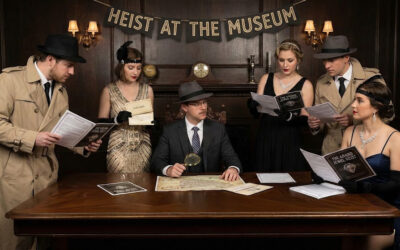Hosting a murder mystery party is one part storytelling, one part chaos management, and one part casting director. Whether you’re wrangling fourth graders or full-grown adults who act like them, getting the right roles into the right hands is a subtle art—and when done right, it elevates your party from “fun” to “legendary.”
Let’s be real: no one wants their sweet aunt Linda accidentally cast as a ruthless jewel thief with commitment issues… unless she’s into that. Which brings us to rule #1:
1. Know Your Players—Not Just Their Names
This isn’t about typecasting based on appearance (don’t do that). It’s about matching vibe to vibe. You probably already know who in your group is theatrical, who’s reserved, and who’s likely to commit to the bit with fake accents and all.
- Give bold, dramatic roles to the bold, dramatic friends.
- Assign low-pressure, less-talkative roles to your introverts or newer guests.
- And if someone’s shy but still wants to participate? Assign them a secretive character—quiet on the outside, mysterious on the inside.
If you’re hosting a jungle-themed mystery like The Emerald Expedition, you might have roles like an ambitious archaeologist, a suspicious snake charmer, or a quirky botanist. You don’t have to know who’s going to “win”—you just need to know who will have the most fun.
2. Read the Bios (They’re Short for a Reason)
In any Megan’s Mysteries game, character bios are written to be light, fast, and family-friendly. Note: Read the bios, not the round 1 or 2 objectives. They’re your cheat sheet to understanding what each role brings to the story—who’s suspicious, who’s innocent, and who’s secretly hoarding a mysterious gemstone in their satchel.
If you’re casting the game yourself, skim the bios and make a note like this:
- Felicia Fossil – knows secrets, slightly paranoid. Assign to your “deep thinker.”
- Dusty McTrail – loyal but easily flustered. Great for someone who plays it straight but gets laughs.
- Penny Press – bold, nosy reporter. Give her to someone who will love interrupting people.
Character variety is the spice of the party. You don’t want everyone being loud. You don’t want everyone being quiet. You want a cast with tension, quirks, and unexpected chemistry—which comes from giving different personality types different narrative flavors.
3. Never Force a Role on a Guest (Seriously)
This is the fastest way to kill the vibe. Even if you think “Uncle Jay would be hilarious as the diva,” if he doesn’t want to play it, it’ll show. And if someone says, “I don’t want to play a guy” or “I’d rather not be a villain”—respect that.
Instead, give people options. Send them 2–3 character descriptions to choose from. Or ask a couple questions like:
- Do you prefer a big or small role?
- Want something mysterious, funny, or heroic?
- Do you want to be a suspect, or more of a red herring?
Letting people choose builds investment. They’re more likely to dress up, get in character, and stay involved until the final reveal.
4. Match Player Count Before Casting
Every Megan’s Mysteries game has “essential” and “optional” characters. Don’t start assigning until you know how many people are showing up. Casting 20 people and having 14 arrive? That’s how you end up playing five parts yourself while crying behind a jungle fern – in normal games. Ours are a bit different. As long as the essential number of people arrive, no problem. The rest just add spice to the operation.
Some more tips:
- Confirm your RSVPs.
- Print or send only the roles you need (we label them clearly in every kit).
- Keep a couple optional characters on standby—just in case someone brings their cousin last-minute.
Side Note/Story Time: When we first started designing these games, it was for group date nights. Couples would buy tickets, show up, and we’d assign roles on the fly—without knowing anything about them. No prep. No personality match. Just vibes. So we built the scripts accordingly.
Each character has a mix of big “group speaking” moments and smaller, more casual interactions. That way, someone who loves the spotlight gets it—and someone who’d rather lurk in the shadows can still shine without needing to go full “Jack Black in School of Rock.”
5. Costumes Help—But You Don’t Need Broadway Wardrobe
People play better when they feel the part. But that doesn’t mean anyone needs to rent a gorilla suit or buy vintage safari gear (unless they want to). Simple costume prompts work wonders:
- “Wear something green and rugged.”
- “Bring a pith helmet or sunhat if you’ve got one.”
- “Borrow a hiking vest or cargo pants from your closet.”
If you’re not sure whether to encourage costumes or keep it casual, check out our guide on setting the right costume tone. It’ll help you strike that perfect balance between “immersive” and “overwhelming.”
6. Save the Drama for the Script (Not the Seating Chart)
If there’s real-life tension between guests, now’s not the time to assign them rival roles. Fictional drama is fun. Actual grudges are not. Here’s a helpful table:
| Situation | Do This | Not This |
|---|---|---|
| Exes in the same room | Put them in different plotlines | Make one accuse the other of murder |
| Shy cousin visiting | Assign a support role with one clue | Make them the secret villain |
| Overconfident theater kid | Give them a big, loud role | Give them a silent monk (unless you want to make a point that they need to chill…) |
Remember, you’re not just casting characters. You’re casting an experience. A good match makes the night smooth, silly, and sensational.
Final Tip: Let People Shine
If you cast well, you’ll see magic happen. That quiet friend who barely spoke at dinner? Suddenly she’s whispering ancient prophecies as the translator on the expedition. The grumpy dad who didn’t want to come? Now he’s interrogating suspects like he’s auditioning for Broadway.
That’s what happens when the drama stays on the page—and the casting brings out everyone’s best selves.
Planning Next?
Ready to match your cast to a jungle adventure they’ll never forget? Check out How to Host a Jungle Expedition Murder Mystery for a full setup guide—decor, food, script, and all.
And remember: the best murder mystery casts aren’t made of professional actors. They’re made of family, friends, and a little bit of fearless fun.




0 Comments